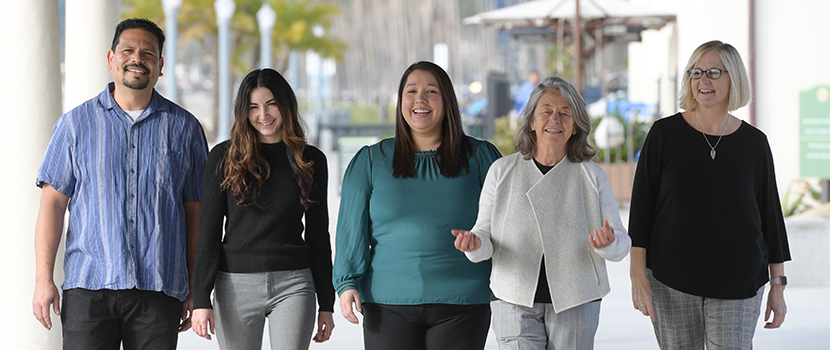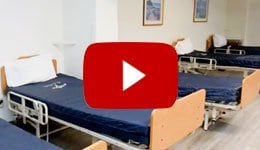Homelessness Outreach

As some of the most vulnerable members of the community, patients experiencing homelessness are at risk of poorer health outcomes and often lack access to basic support in recovering from illness or injury. Access to supported, stable housing through a Housing First approach decreases homelessness, increases housing stability, and improves quality of life and health outcomes.1,2
According to the 2020 Point in Time Count, Santa Barbara County has more than 1,800 individuals experiencing homelessness, of whom approximately 50% live in the City of Santa Barbara.3 Supporting these community members in achieving better health and access to essential resources requires a coordinated, multi-sectoral approach.
To do this, Cottage Population Health partners with local organizations and agencies to connect homeless neighbors to housing, supportive services, and medical homes.
Recuperative Care Program

Cottage Recuperative Care
Cottage Health, in partnership with PATH Santa Barbara, hosts the Cottage Recuperative Care Program.
Partnerships in Care Video
Patients experiencing homelessness, who are healthy enough to leave the hospital, yet are still in need of medical care and a safe place to recover, face challenging circumstances for recuperation.
While patients are being cared for and healing, the Cottage Recuperative Care Program (RCP) at PATH also helps empower them through connections with community support services, so they can continue progressing after they’ve completed the program.
Recuperative Care Program Features
- Ten beds and up to 90 days of care
- Shelter and food with 24/7 assistance from health aides
- Nursing care from a registered nurse
- Partnerships with community resources, including housing and job skill training
- Case management from a community navigator to develop a care plan for each patient
- Referrals and coordination of medical appointments
- Assistance with transportation
- Access to the on-site Santa Barbara County Health Care Center
Program Partners
Cottage Recuperative Care Program
For more information about the Cottage Recuperative Care Program or to make a referral, please contact Becky Santana at 805-324-9241.
Coordinating care for patients during and after their stays in the program relies on a team of partners:
Who Qualifies?
To qualify for the Cottage Recuperative Care Program, a patient must:
- Be experiencing homelessness
- Have an appropriate acute medical need
- Be alert, able to care for self, and self-sufficient in activities of daily living (ADLs)
- Be clinically stable – both medically and psychiatrically
- Be at risk for frequent hospital visits
- Agree to a Treatment Plan
- Have low or no risk for severe, acute withdrawal syndrome from alcohol or illegal drugs
- Be willing and able to follow PATH’s behavioral rules, good neighbor policy and medication monitoring practices
Who’s On the Care Team?
Patients can trust the RCP care team for unconditional, compassionate care starting on day one and continuing for up to 90 days. This specialized team includes:
- Medical director from Cottage Health who supervises the program
- Registered nurse from Cottage Health
- Community health navigator from Cottage who connects patients to community support organizations for housing and other basic needs
- Health aides from PATH who provide around-the-clock assistance
Santa Barbara Connect Home
Outreach Updates
More information and outreach updates can be found on the City of Santa Barbara website.
Learn More
Santa Barbara Connect Home is supported by the California Homeless Emergency Aid Program (HEAP) and is a partnership of the City of Santa Barbara, City Net, Cottage Health, Santa Barbara Restorative Police, Housing Authority of the City of Santa Barbara and PATH.
The program focuses on the needs of the most vulnerable individuals experiencing homelessness and the highest utilizers of crisis services, such as police, fire, AMR and the emergency department. Clients are linked to coordinated case management and a mobile navigation center to ensure connection to housing, medical and support services.
A team of outreach workers, including navigators, a registered nurse, and Restorative Police Officers, builds trust with these vulnerable clients to help them find the help they need.
1 Tsemberis, S. (1999), From streets to homes: An innovative approach to supported housing for homeless adults with psychiatric disabilities. J. Community Psychol., 27: 225-241. doi:10.1002/(SICI)1520-6629(199903)27:2<225::AID-JCOP9>3.0.CO;2-Y
2 Wood, L., Wood, N.J.R., Vallesi, S., Stafford, A., Davies, A. and Cumming, C. (2019), "Hospital collaboration with a Housing First program to improve health outcomes for people experiencing homelessness", Housing, Care and Support, Vol. 22 No. 1, pp. 27-39. https://doi.org/10.1108/HCS-09-2018-0023
3 Santa Maria/Santa Barbara County Continuum of Care (2020). Point in Time Count. https://countyofsb.org/asset.c/5234.